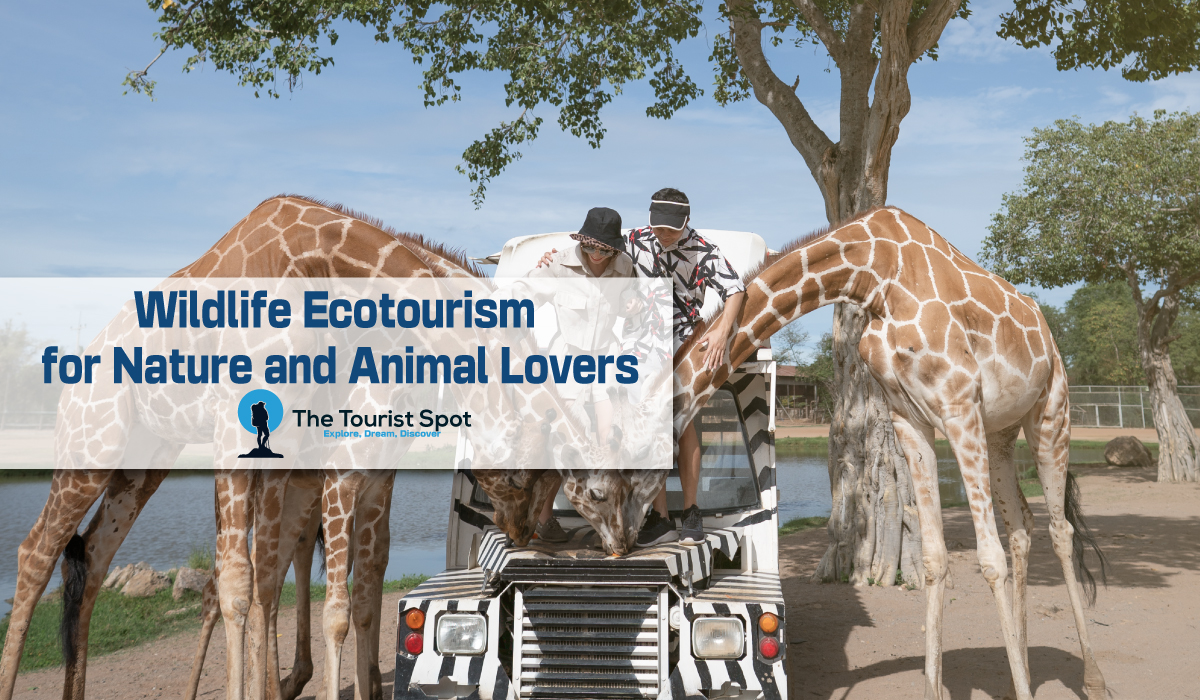For travelers who dream of seeing animals in their natural habitats and preserving the environment, wildlife ecotourism offers the perfect blend of adventure and ethics. It goes beyond traditional tourism by supporting conservation, protecting ecosystems, and involving local communities — all while offering unforgettable moments with the natural world.
Whether you’re hiking through a jungle, observing elephants on a savannah, or snorkeling alongside sea turtles, wildlife ecotourism creates powerful connections between people, animals, and nature.
What is Wildlife Ecotourism?
Wildlife ecotourism focuses on responsible travel to natural areas that conserves the environment and improves the well-being of local people. It typically involves observing wildlife in the wild while minimizing negative impact.
Unlike traditional tourism that often puts pressure on nature, wildlife ecotourism emphasizes:
- Conservation education
- Animal welfare
- Sustainable practices
- Community engagement
- Low-impact exploration
For nature and animal lovers, this type of travel turns sightseeing into something much more meaningful.
Why Wildlife Ecotourism Matters
With habitat destruction and climate change threatening biodiversity, tourism can either harm or help wildlife. Choosing ecotourism helps protect endangered species, fund preservation programs, and educate travelers on the importance of ecosystems.
Key benefits include:
- Funding Conservation Efforts: Park fees and tour costs often support wildlife protection.
- Raising Awareness: Travelers return home inspired to support environmental causes.
- Supporting Communities: Local guides, homestays, and artisans benefit directly.
- Limiting Harmful Practices: Ethical wildlife travel discourages animal cruelty and exploitation.
Top Wildlife Ecotourism Destinations to Explore
Let’s take a look at some of the world’s best wildlife ecotourism destinations where nature is respected, and adventure is guaranteed.
1. Costa Rica – Biodiversity in the Rainforest
Costa Rica is a model for eco-friendly travel. With over 25 percent of the country protected as parks and reserves, it’s perfect for spotting sloths, monkeys, toucans, and colorful frogs. Sustainable lodges and expert guides make it an easy pick for eco-conscious travelers.
2. Kenya – Ethical Safaris and Community Conservation
Kenya offers thrilling safaris in places like the Masai Mara, but it’s also at the forefront of community-based conservation. Locally run reserves and eco-lodges provide respectful ways to observe elephants, lions, and rhinos in the wild while supporting native communities.
3. Galápagos Islands – Nature’s Living Laboratory
Few places match the biodiversity and ecological importance of the Galápagos. Strict visitor limits and eco-certified tours ensure low impact on fragile environments. Get close to sea lions, marine iguanas, and giant tortoises in a setting unlike anywhere else.
4. Borneo – Rainforests and Orangutans
Borneo’s ancient jungles are home to orangutans, pygmy elephants, and clouded leopards. Visiting this region through eco-certified programs allows travelers to learn about rehabilitation efforts and see animals in protected forests, not cages.
5. Madagascar – Unique Species and Diverse Landscapes
Madagascar’s isolation created a hotspot of rare wildlife found nowhere else. Lemurs, chameleons, and baobab trees attract eco tourists seeking untouched ecosystems. Community-based lodges help protect habitats and promote sustainable travel practices.
6. Antarctica – Icy Wilderness and Marine Life
Antarctica might seem remote, but it’s increasingly accessible through small-scale, low-impact expeditions. Wildlife lovers can see penguins, seals, and whales while learning about climate change and environmental research in one of the planet’s last frontiers.
7. India – Tigers and Jungle Safaris
India’s national parks like Ranthambore and Bandhavgarh offer a chance to see Bengal tigers, leopards, and a variety of birdlife. Sustainable safari operators now use electric vehicles, hire local guides, and support anti-poaching efforts.
8. Australia – Marine and Outback Exploration
From the Great Barrier Reef to the Outback, Australia is packed with diverse wildlife experiences. Snorkeling with reef creatures or spotting kangaroos and koalas in natural habitats can be done sustainably with eco-certified tours and conservation programs.
9. Rwanda – Gorilla Trekking with Purpose
Rwanda’s mountain gorilla trekking experiences are highly regulated and ethical. Only small groups are allowed, and permits directly fund conservation efforts and local development. It’s an emotional, once-in-a-lifetime encounter with endangered primates.
10. Canada – Wilderness and Wildlife Watching
Canada offers vast national parks and rich marine life along its coasts. Spotting whales in British Columbia or moose in Newfoundland can be done responsibly through certified wildlife tours that prioritize ecosystem health and education.
Choosing the Right Wildlife Ecotourism Experience
Not all wildlife tours are created equal. To ensure you’re making an ethical choice, consider the following:
- Check for Eco-Certifications (like EarthCheck, Rainforest Alliance, or Green Globe)
- Avoid Direct Animal Interaction (no riding, no petting)
- Travel with Reputable Operators who focus on education, not entertainment
- Respect Local Cultures and customs around wildlife and nature
- Ask Questions about how your money supports conservation
The goal is to enjoy nature without disturbing it.
Tips for Being a Responsible Wildlife Traveler
You can make your trip even more meaningful by following these tips:
- Observe from a Distance: Use binoculars or zoom lenses — never chase or touch wildlife.
- Stay on Trails: Protect fragile ecosystems by sticking to designated paths.
- Carry Reusable Gear: Bottles, bags, and utensils help reduce waste in sensitive areas.
- Choose Local and Sustainable Products: Support artisans and local eco brands.
- Leave No Trace: Always take your trash and respect the natural environment.
Final Thoughts: Travel Wild, Travel Right
Wildlife ecotourism is about more than ticking animals off a checklist. It’s about forming a deep respect for our planet’s creatures and playing a role in their protection. Every time you choose a responsible wildlife experience, you’re casting a vote for a more sustainable travel future.
Whether you’re trekking through a jungle, cruising in the Arctic, or walking along savannah trails, remember that every action matters. With wildlife ecotourism, nature and travelers both win — one magical moment at a time.

